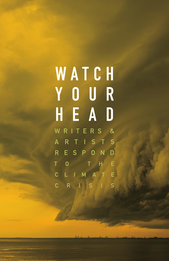|
12/10/2020 POETRY: QURAT DARLOVELETTERS TO THE DEEP My eyes & conscience are clear. I filled my backpack with rocks & loveletters to the deep & swung it into the lake. I grew up with hardened shoreline instead of sand between my toes. Myths become less plausible every day. Mermaids pulling twist ties from their gills & kraken choking on plastic bags mistaken for squid, limbs shredded by propellers. Oil slicked wings hold no air, no matter the skies they fold into themselves. Rivers choked with plastic like my father’s arteries, dredged from the bones of sleeping giants, cling wraps the voice to my throat for a species that worships gods of convenience. I sunk a knife into a tree trunk & it bled. I tore open my calf on a rusted nail & tried to stop the sap leaking through my fingers. I raised a rifle to my shoulder, shot the expectant moon & felt the spray on my cheek. Felt the sky recoil. I set fire to the sea & built palaces of salt. Our futures have gone from picket fences to picket lines. Youth is its own burden. I explain to an old white man why having children would feel immoral, & he suggests I trust that they will fix this, as if that was not what his generation already did. Blind faith in false gods, hope an offering left at their shrines. Myths become less plausible every day. My eyes & conscience are clear. Qurat Dar (she/they) is a spoken word performer, poet, multi-genre writer, and environmental engineering student. She has had work in Augur Magazine, The Temz Review, and Anathema Magazine, among others. Qurat was a 2019 recipient of the Ron Lenyk Inspiring Youth Arts Award and is a Best of the Net finalist. She was also recently crowned the 2020 Canadian Individual Poetry Slam (CIPS) National Champion. Their debut poetry chapbook is forthcoming with Coven Editions.
Find them on Instagram: @itsnotquart and Twitter: @itsnotquart 12/10/2020 POETRY: CATRIONA WRIGHTNOTES TOWARDS AN ANTHROPOCENE FABLE AT A RUSSIAN SAUNA IN MISSISSAUGA Rumpelstiltskin’s first wife, I enter and exit the steam room in a eucalyptus cloud. My rumpled robe scratches. Silt rises to skin surface. I scrub my pores with sea salt. I pull a rusted chain and a wooden bucket tips cool torrent on my head. No one in these microclimates has a name big enough for forests, for air. I am trying to outrun my recurring daymare, the one with the turret. This olive string bikini, once sinuous, is now only fit for sweating myself alive. I beg a sauna man in a wool cap to wave his parched birch wand. My inner bitch wakes up, whining. I haven’t fed her in too long. My cells realign themselves, spread around. I eavesdrop on the heat, practice different pronunciations. He ate, she ate, we ate all the sun’s treats, licked black seeds from slit vanilla beans, plucked gold croaks from toad throats. I am trying to escape the king’s wealth, the kind that slashes and slinks through holes. I get to stay here longer than all the white rhinos, the bees. Will I hand a firstborn to the burn? Infused with cedar scent, buzzing, I lower myself into a barrel of glacial water. I imagine a cryogenic prince charming carrying me, limp, into the next ice age. Soothed, I shower. Calmer and slower, I sit in the tea room afterward, drinking vodka and kombucha, replenishing my salt sea with pickle brine. A television screens our ever after, a nature documentary about bleached coral reefs, all those fabulous bows and rainbows frozen white in the sunshine. Originally published in PRISM International (Issue 57.4: Spring 2019) Catriona Wright is the author of the poetry collection Table Manners (Véhicule Press, 2017) and the short story collection Difficult People (Nightwood Editions, 2018). Her poems have appeared in American Poetry Review, The Walrus, Fiddlehead, and Lemon Hound, and they have been anthologized in The Next Wave: An Anthology of 21st Century Canadian Poetry and in The Best Canadian Poetry 2015 & 2018.
12/10/2020 POETRY: LAUREN LEEHOLLOW cars pass through the tainted streetlights of suburbia while racoons ravage through yesterday’s trash and crickets talk to the trees “where did all those bees go?” and leaves lazily linger on branches and sparrows speak of a future somewhere sometime when the racoons retire from trashcan diving and the crickets cry and the trees try to bring back the bees because cars passed through and homes were built brick after brick on top of nests and nestles one after the other until one day home was as hollow as a bird bone Lauren Lee is a graduate from Western University with a degree in English Literature and Creative Writing. She writes creative non-fiction and poetry; her work has been published in Iconoclast (2020) Occasus Literary Journal (2018).
|
|
ISSN 2563-0067 © Copyright 2023 | Watch Your Head Contributors Sign up for our Newsletter Buy our print anthology Watch Your Head: Writers & Artists Respond to the Climate Crisis (Coach House Books, 2020). |
